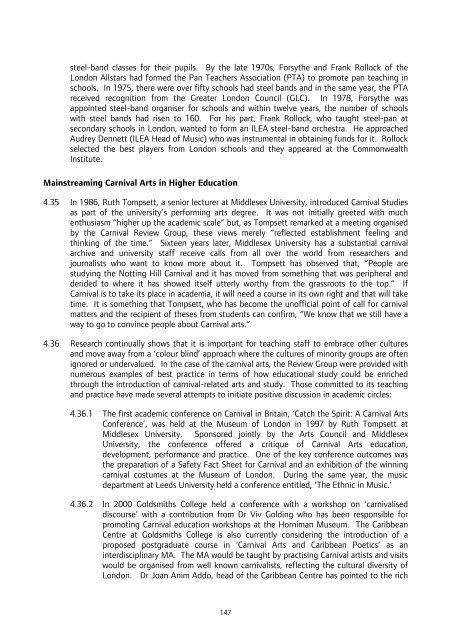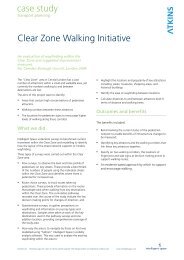Notting Hill Carnival Strategic Review - Intelligent Space
Notting Hill Carnival Strategic Review - Intelligent Space
Notting Hill Carnival Strategic Review - Intelligent Space
You also want an ePaper? Increase the reach of your titles
YUMPU automatically turns print PDFs into web optimized ePapers that Google loves.
steel-band classes for their pupils. By the late 1970s, Forsythe and Frank Rollock of the<br />
London Allstars had formed the Pan Teachers Association (PTA) to promote pan teaching in<br />
schools. In 1975, there were over fifty schools had steel bands and in the same year, the PTA<br />
received recognition from the Greater London Council (GLC). In 1978, Forsythe was<br />
appointed steel-band organiser for schools and within twelve years, the number of schools<br />
with steel bands had risen to 160. For his part, Frank Rollock, who taught steel-pan at<br />
secondary schools in London, wanted to form an ILEA steel-band orchestra. He approached<br />
Audrey Dennett (ILEA Head of Music) who was instrumental in obtaining funds for it. Rollock<br />
selected the best players from London schools and they appeared at the Commonwealth<br />
Institute.<br />
Mainstreaming <strong>Carnival</strong> Arts in Higher Education<br />
4.35 In 1986, Ruth Tompsett, a senior lecturer at Middlesex University, introduced <strong>Carnival</strong> Studies<br />
as part of the university’s performing arts degree. It was not initially greeted with much<br />
enthusiasm “higher up the academic scale” but, as Tompsett remarked at a meeting organised<br />
by the <strong>Carnival</strong> <strong>Review</strong> Group, these views merely “reflected establishment feeling and<br />
thinking of the time.” Sixteen years later, Middlesex University has a substantial carnival<br />
archive and university staff receive calls from all over the world from researchers and<br />
journalists who want to know more about it. Tompsett has observed that, “People are<br />
studying the <strong>Notting</strong> <strong>Hill</strong> <strong>Carnival</strong> and it has moved from something that was peripheral and<br />
derided to where it has showed itself utterly worthy from the grassroots to the top.” If<br />
<strong>Carnival</strong> is to take its place in academia, it will need a course in its own right and that will take<br />
time. It is something that Tompsett, who has become the unofficial point of call for carnival<br />
matters and the recipient of theses from students can confirm, “We know that we still have a<br />
way to go to convince people about <strong>Carnival</strong> arts.”<br />
4.36 Research continually shows that it is important for teaching staff to embrace other cultures<br />
and move away from a ‘colour blind’ approach where the cultures of minority groups are often<br />
ignored or undervalued. In the case of the carnival arts, the <strong>Review</strong> Group were provided with<br />
numerous examples of best practice in terms of how educational study could be enriched<br />
through the introduction of carnival-related arts and study. Those committed to its teaching<br />
and practice have made several attempts to initiate positive discussion in academic circles:<br />
4.36.1 The first academic conference on <strong>Carnival</strong> in Britain, ‘Catch the Spirit: A <strong>Carnival</strong> Arts<br />
Conference’, was held at the Museum of London in 1997 by Ruth Tompsett at<br />
Middlesex University. Sponsored jointly by the Arts Council and Middlesex<br />
University, the conference offered a critique of <strong>Carnival</strong> Arts education,<br />
development, performance and practice. One of the key conference outcomes was<br />
the preparation of a Safety Fact Sheet for <strong>Carnival</strong> and an exhibition of the winning<br />
carnival costumes at the Museum of London. During the same year, the music<br />
department at Leeds University held a conference entitled, ‘The Ethnic in Music.’<br />
4.36.2 In 2000 Goldsmiths College held a conference with a workshop on ‘carnivalised<br />
discourse’ with a contribution from Dr Viv Golding who has been responsible for<br />
promoting <strong>Carnival</strong> education workshops at the Horniman Museum. The Caribbean<br />
Centre at Goldsmiths College is also currently considering the introduction of a<br />
proposed postgraduate course in ‘<strong>Carnival</strong> Arts and Caribbean Poetics’ as an<br />
interdisciplinary MA. The MA would be taught by practising <strong>Carnival</strong> artists and visits<br />
would be organised from well known carnivalists, reflecting the cultural diversity of<br />
London. Dr Joan Anim Addo, head of the Caribbean Centre has pointed to the rich<br />
147








